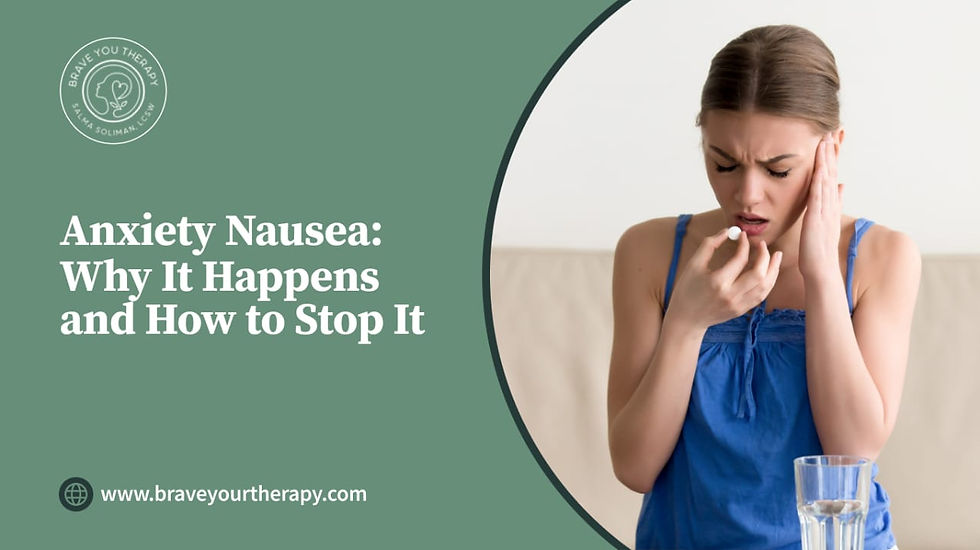What Is Group Therapy and How Does It Work?
- iqrafarzand04
- Aug 3
- 4 min read
Updated: Aug 4

When facing emotional or psychological challenges, it’s easy to feel isolated. Group therapy offers a powerful reminder that you’re not alone. By bringing together individuals with shared experiences, group therapy creates a safe and supportive space for healing, growth, and connection. Led by a licensed therapist, these sessions allow participants to explore their struggles, gain new perspectives, and build meaningful relationships. In this blog, we’ll break down what group therapy is, how it works, and why it might be the right choice for you or someone you care about.
Understanding Group Therapy
Group therapy is a form of psychotherapy where multiple participants come together under the guidance of a trained mental health professional to explore and work through personal challenges. Unlike individual counseling, group therapy creates a shared space for people facing similar issues to connect, communicate, and grow together.
Common topics addressed in group therapy include anxiety, depression, trauma, addiction, grief, relationship difficulties, and stress. Sessions are typically structured around specific therapeutic goals, with the facilitator guiding discussions and activities that promote healing and personal development.
By listening, sharing, and offering feedback, group members gain valuable insights not only into their own experiences but also from the perspectives of others. This collaborative environment fosters empathy, reduces feelings of isolation, and often leads to powerful emotional breakthroughs that individual therapy may not always provide.
Types of Group Therapy
Group therapy comes in various forms, each tailored to different needs. Here are some common types:
Cognitive Behavioral Groups focus on changing negative thinking patterns and behaviors. These groups often include structured exercises that help participants develop practical coping skills.
Psychoeducational Groups provide education about specific mental health conditions and strategies for managing them. Topics may include stress reduction techniques, managing anxiety, or understanding trauma.
Support Groups offer emotional support for those going through similar life situations, such as divorce, loss, or chronic illness. While not always led by licensed professionals, many are facilitated by trained moderators.
Interpersonal Process Groups focus on improving relationship skills. These sessions often explore communication styles, trust, boundaries, and conflict resolution.
Skill Development Groups teach techniques to manage emotions, improve mindfulness, or regulate behavior, commonly used in dialectical behavior therapy (DBT) and similar methods.
Who Can Benefit From Group Therapy?
Many individuals benefit from group therapy, including those who:
Feel isolated or misunderstood
Struggle with anxiety or depression
Are navigating major life transitions
Seek better communication skills
Want to develop emotional awareness
Are recovering from trauma or addiction
Adults seeking support often find comfort and strength in knowing they are not alone. Listening to others can reveal new ways to view problems, while also offering reassurance through shared struggles. Participants learn not only from the therapist but also from their peers.
How Group Therapy Promote Healing
Connection forms the heart of healing in group settings. Individuals who feel alone in their struggles often discover a sense of belonging. Hearing others voice similar concerns can be deeply validating.
Feedback is another valuable component. In a respectful and supportive group, honest feedback can spark important personal insight. Learning how one’s words and actions affect others can strengthen emotional intelligence.
Accountability plays a key role. Showing up each week and sharing progress motivates participants to continue their personal work outside of sessions. This sense of shared purpose builds momentum.
Skill practice happens in real time. Group members can try new communication tools, boundary-setting strategies, or emotional regulation techniques with others who understand the process.
Common Misconceptions
Some adults hesitate to join group therapy because they believe:
They must share personal details right away
Their issues are too different from others in the group
It will feel like public speaking
One-on-one therapy is always more effective
In reality, participants choose how much they want to share and when. Therapists carefully match group members to maintain relevance and cohesion. The focus is on conversation, not performance. Many clients use group therapy in addition to individual therapy for a well-rounded approach to mental health.
How to Choose the Right Group
Finding the right group is an important part of the process. Here are key questions to consider:
What is the group’s main focus or theme?
Who leads the group, and what are their qualifications?
Is the group open (new members join anytime) or closed (same members throughout)?
What is the expected commitment?
What are the group guidelines around confidentiality and conduct?
Therapists often offer a free consultation to determine if the group is a good match. This conversation can provide clarity on goals, expectations, and fit.
Taking the First Step
Choosing to join a group can feel intimidating at first. Yet the benefits often far outweigh the initial hesitation. Real change begins when individuals feel seen, heard, and accepted for who they are.
Those interested in starting their journey with group therapy can learn more about available programs, schedules, and topics by exploring group therapy services in Los Angeles. A conversation with a therapist can help identify the group that aligns best with personal goals and comfort level.
Group therapy offers a unique path to healing, rooted in community and shared understanding. For adults ready to grow through connection, it provides a powerful and proven avenue toward better mental health.




Comments